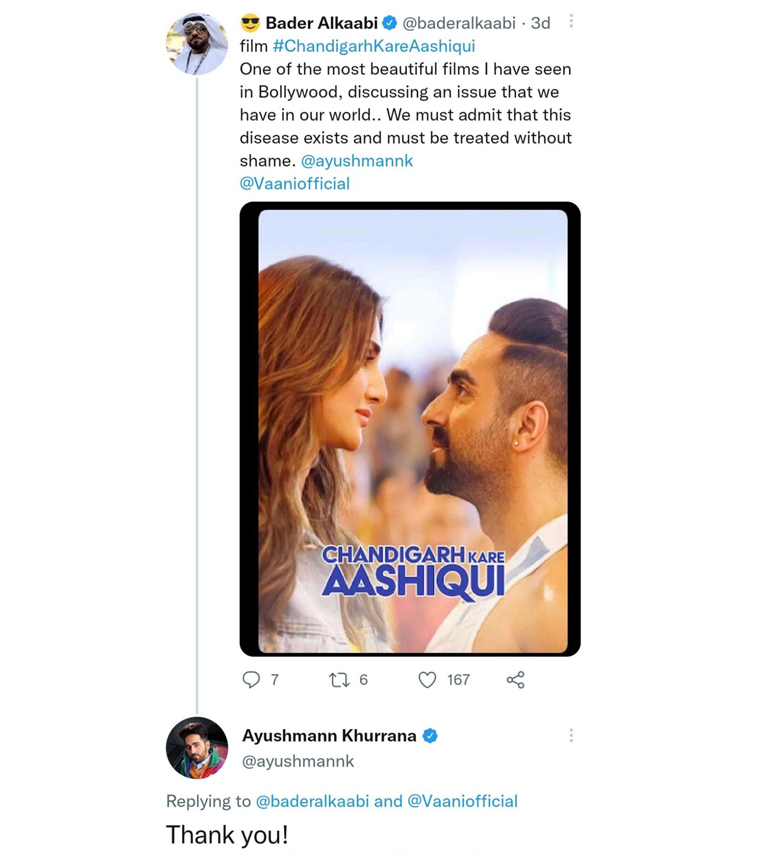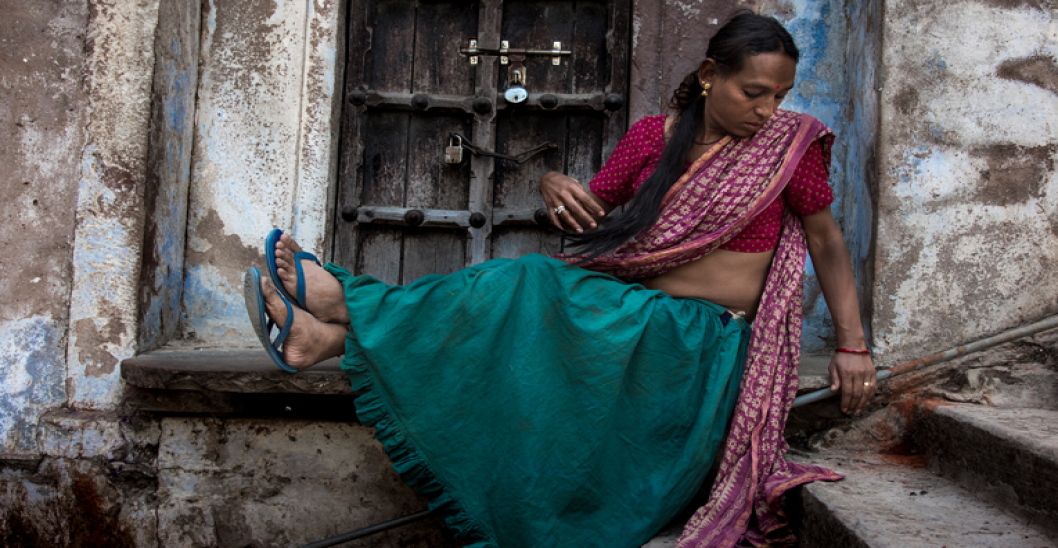With each passing week, we get a new trailer for a Bollywood film featuring a prominent queer storyline, but not a queer actor is to be found for miles.
In a February 2020 interview with Anupama Chopra for Film Companion, the cast members of the film Shubh Mangal ZyadaSaavdhan (a Bollywood gay rom-com) claimed that they auditioned a lot of gay actors but couldn’t find any. Lead actor Ayushmann Khurrana argues that a mainstream actor is needed in Indian films to normalise taboo subjects like queer romance. And the role of the second gay lead went to heterosexual actor Jitendra Kumar (of TVF fame). Director Hitesh Kewalya also shares a heartfelt story about how he broke several stereotypes by being a straight man who wrote a gay story. Such an immense sacrifice indeed. Khurrana since then has gone on to act in another queer film, 2021’s Chandigarh KareAashiqui, wherein again Vaani Kapoor - a heterosexual cisgendered woman - played the role of a transwoman. This drew a lot of criticism, especially from trans activists, who saw the portrayal as a means to crack some more transphobic jokes and a genuine disservice to their everyday struggles.
And then our dear Ayushmann went ahead and did this, further proving that sometimes it’s more Queerbating than actual Queer educating happening in Bollywood films.

Source: Twitter
Although several valid points have been made surrounding the need for queer actors to portray queer characters to better accentuate the nuances of said characters, producing queer Bollywood films is way more trickier than their western counterparts.
While a Tom Hanks or a Philip Seymour Hoffman can win an Oscar by portraying gay characters in Hollywood, Bollywood historically has not been kind to actors playing gay characters. Known within the industry as the “gay curse” in hush hush tones, it means that several famous actors have seen their careers steadily decline post portraying queer roles. Most famously, or infamously in this case, Sanjay Suri and Purab Kohli post My Brother… Nikhil and Samir Soni post Fashion. In the Film Companion interview, Khurrana even claims that several theatre artistes from India didn’t want to play a gay character fearing it would out them and further hinder their chances to play straight characters in future projects.
Misrepresentation of trans and queer characters isn’t new to Indian cinema. The major issue stems from the fact that most of these characters are either villainous, deranged, or the butt of jokes. In fact, Sadashiv Amrapurkar’s portrayal of Maharani in Sadak (1991) actually won him a Filmfare award. The jokes have carried on to this day, in films like Partner, Kya Kool Hai Hum, and Masti. It is also a common display on TV comedy shows hosted by Kapil Sharma, where men will crossdress to make fun of women. It's insulting to not only women but genuine drag artists who elevate what it’s like to be a woman and not make crossdressing the punchline every single chance they get.
I am often asked how I feel about such portrayals, and in all honesty, I don’t mind it. As long as the actor playing the role has made an effort to understand the character and where they are coming from. But when someone like Ayushmann Khurrana does it purely because it’s the “in thing” right now, that’s what really breaks my heart. But my gut feeling can’t dictate how an industry runs. So I reached out to some of the people who are working in tow with Bollywood to see what they feel.
Rudrani Chhetri is a renowned activist who portrayed the role of Anarkali, a transwoman, in Vikas Khanna’s 2019 film The Last Color. “I did not even audition for the role initially, but when I went with two girls who did want to try out for the role of Anarkali, they asked me to audition as well. Then Vikas (Khanna) saw my test and ended up casting me,” Chhetri says. However, despite the critical acclaim her stellar performance got her, the offers since then have dried up. She adds “If everyone has seen my ability, then what’s stopping other filmmakers from casting me?”

Photo Credit: Rajesh Kumar Singh
Pradipta Ray, a queer filmmaker herself, states that oftentimes it comes down to the directors and their vision. She says, “While casting for roles, queer or straight, the director and the team will look for actors first and foremost. It’s a craft that is polished over time. Hence for a Sanjay Leela Bhansali it makes more sense to cast a veteran actor like Vijay Raaz (in the upcoming GangubaiKathiawadi).” Bigger stars for Bollywood producers also mean a better return on their investments. When an Abhishek Bachchan and John Abraham play a make-believe gay couple in Dostana, it gets butts in seats, no matter the amount of jokes that further the stereotype queer people already deal with.
Photo Credit: Pradipta Ray
Indrajeet Ghorpade, activist and founder of the page Yes, We Exist, tells us the dangerous myths surrounding transgender persons are only further propagated by these misplaced castings. He says, “When cisgender men like Akshay Kumar or Vijay Raaz or Ashutosh Rana play characters like Laxmii, Raziya or Lajja, who are either possessed, villainous, or psychopaths, they promote this myth further. The perception that then builds in the society directly leads to violent attacks and discrimination against trans people.”
And it does play out in reality in way harsher ways than in films. Between 2018-2019, trans women were lynched in Hyderabad, Udaipur, and Jalpaigudi, because the mobs were convinced they were child kidnappers. In January 2022, the Tripura Police picked 4 trans women who were returning from a party, falsely accusing them of extortion and forced them to strip in front of male and female police officers to prove that they were trans women.
Ghorpade adds, “Bollywood casts famous cisgender men to play roles of trans women because this suits their business interests however this comes at a very high cost, it comes at the cost of the safety, wellbeing and dignity of trans* persons.
Gazal Dhaliwal is a renowned screenwriter who is behind films like Lipstick Under My Burkha and Ek Ladki Ko Dekha Toh Aisa Laga, recounts that when one of her first short films, A Monsoon Date, came out, she was apprehensive about a cisgender woman - Konkana Sen Sharma - take over the role of a transwoman. “But Konkana was so good in that role and she made it her own. If a director and actor have dealt with their queer character with sensitivity, it shows. And that goes a long way in getting the conversation started.”
She does agree that while heterosexual actors should be completely allowed to play gay or lesbian men and women, with trans characters, it becomes a little more dicey. As Ray also points out, it’s a double-edged sword. “If people can’t act, then they can’t be cast. But if they are never cast, how will they ever build a worthy resume?”
Chhetri, however, disagrees. She says that the queer community has constantly been working on the backend at even the lowest positions, be it as makeup artists or being dancers and background actors. But there are a lot of excellent performers who can put others to shame. “Everything has always been taken away from the transgender community - be it rights, eduction, or dignity. And now even possible work and acting roles,” Chhetri concludes.
As Ghorpade points out, “Would Sanjay Leela Bhansali cast Amitabh or SRK to play Gangubai simply because they are Bollywood biggies and can attract a larger audience than Alia Bhat? Then how can he cast Vijay Raaz to play Raziya?”
Film critic Sucharita Tyagi states that while there is a guaranteed need to cast queer actors for queer roles, there aren’t that many actors or opportunities to begin with. She says, “I spoke with Abhishek Kapoor and asked him this about casting Vaani Kapoor in Chandigrah Kare Aashiqui, and while he says that Hollywood must be held accountable for casting trans people as trans characters, in India any step forward with the right intention is a step toward normalising conversation around queerness, which hopefully will enable more queer actors to join the acting industry.”
It’s also worth noting that while films like Badhai Ho and Gangubai Kathiawadi are met with open arms, Netflix’s Cobalt Blue is languishing in unreleased hell to “avoid controversies”, and Onir’s film about a gay soldier can’t get a No Objection Certificate from the Defense Ministry.
As much as Bollywood wishes to boast of queer inclusion in films, the fact remains that queer actors and independent filmmakers are still not getting the work they deserve.
If you wish to further dive into the psyche behind why portrayal of trans and queer characters so far in films affects an entire generation of kids growing up on the spectrum, then one necessary viewing is the documentary Disclosure on Netflix, which features actual trans actors and writers and activists making a fair and clear argument as to why filmmakers need to stop putting men in female clothing and call it a day.
Disclaimer: The views expressed in this article are independent views solely of the author(s) expressed in their private capacity and do not in any way represent or reflect the views of 101india.com.
Written By: Navin Noronha
How A Mythical Deity Became The Most Revered God In History
Dev Deepawali Celebration By Bal Brahmachari Kids Of Varanasi
All Access Mumbai With Milind Deora x JIO
Promoted Content by Outbrain |




Subscribe to our Newsletter. Your inbox will get all our latest stories and annoucements.